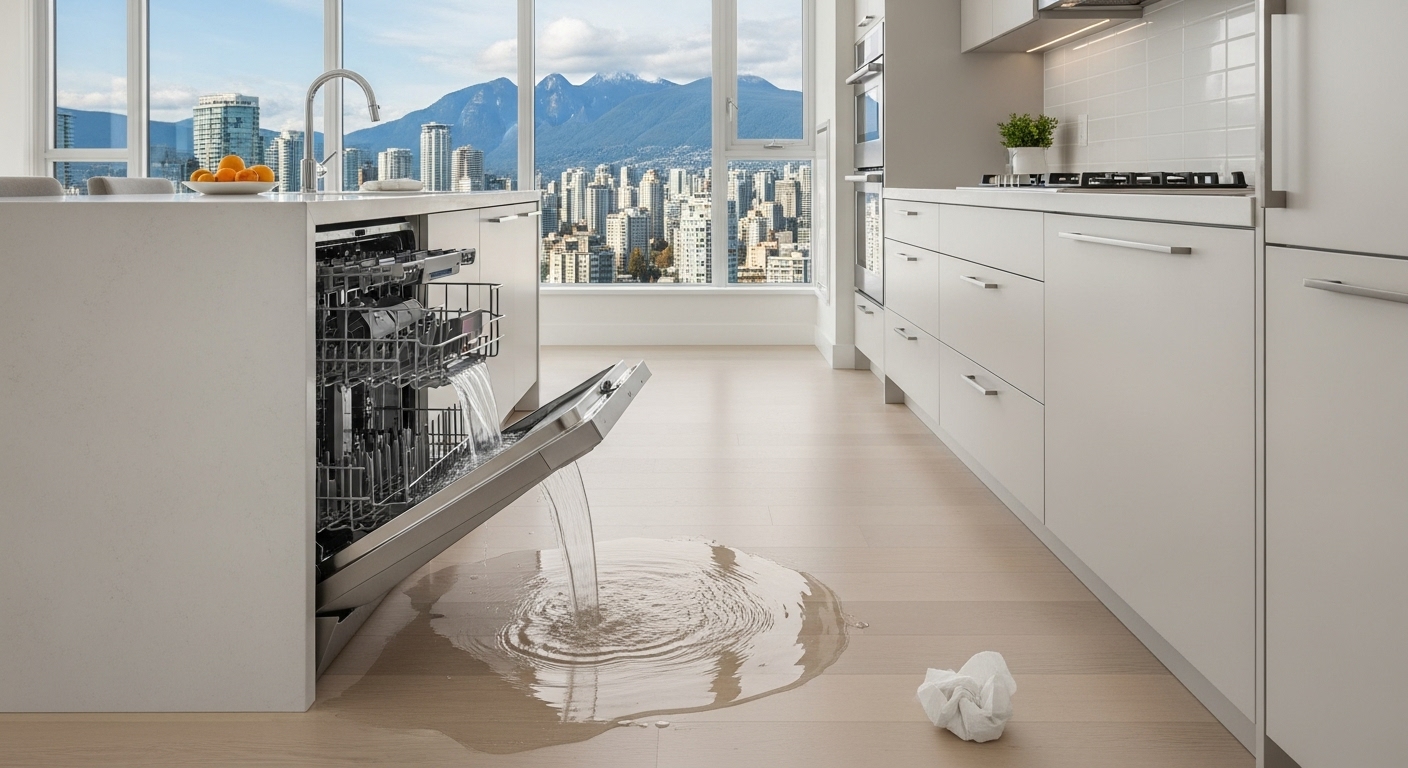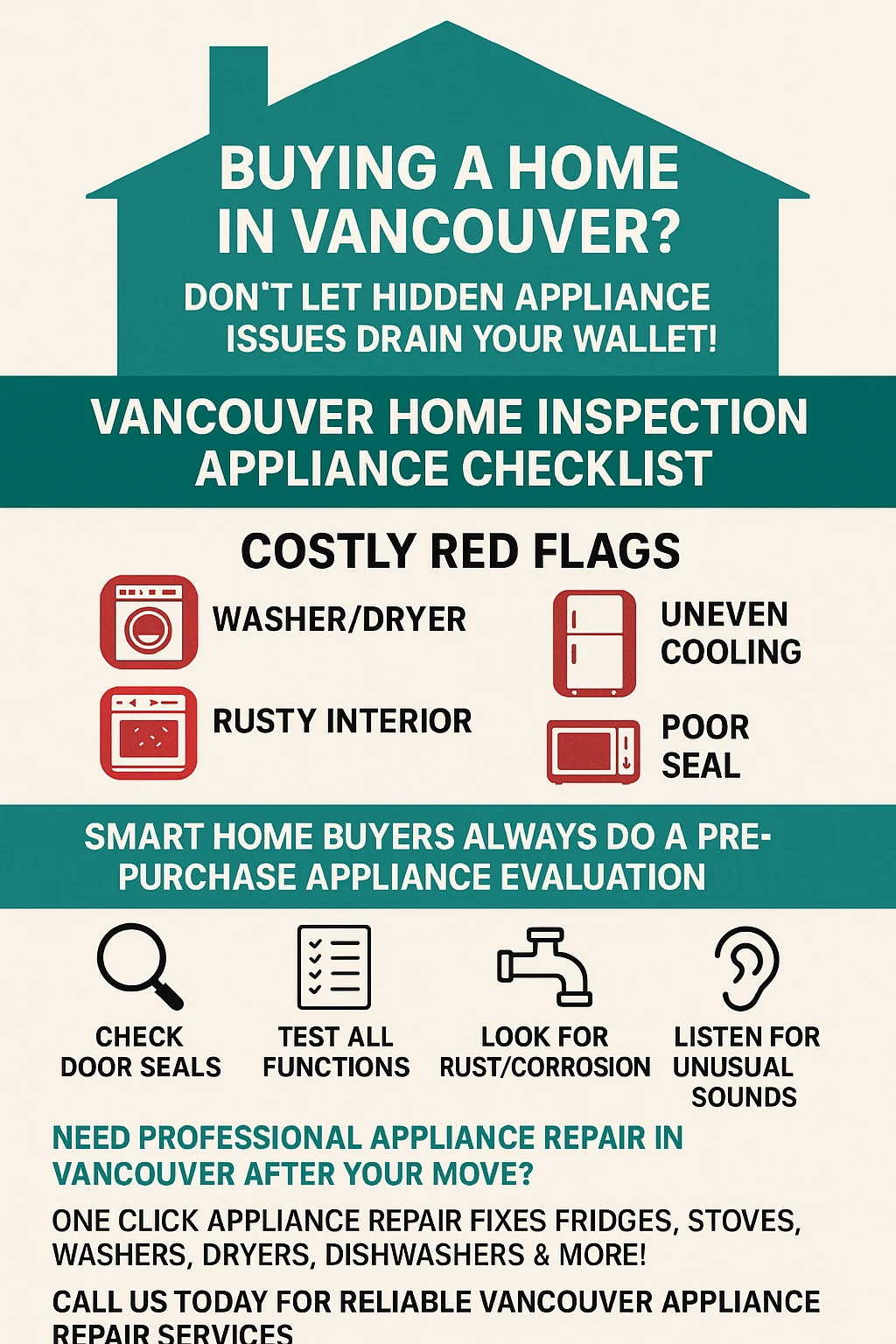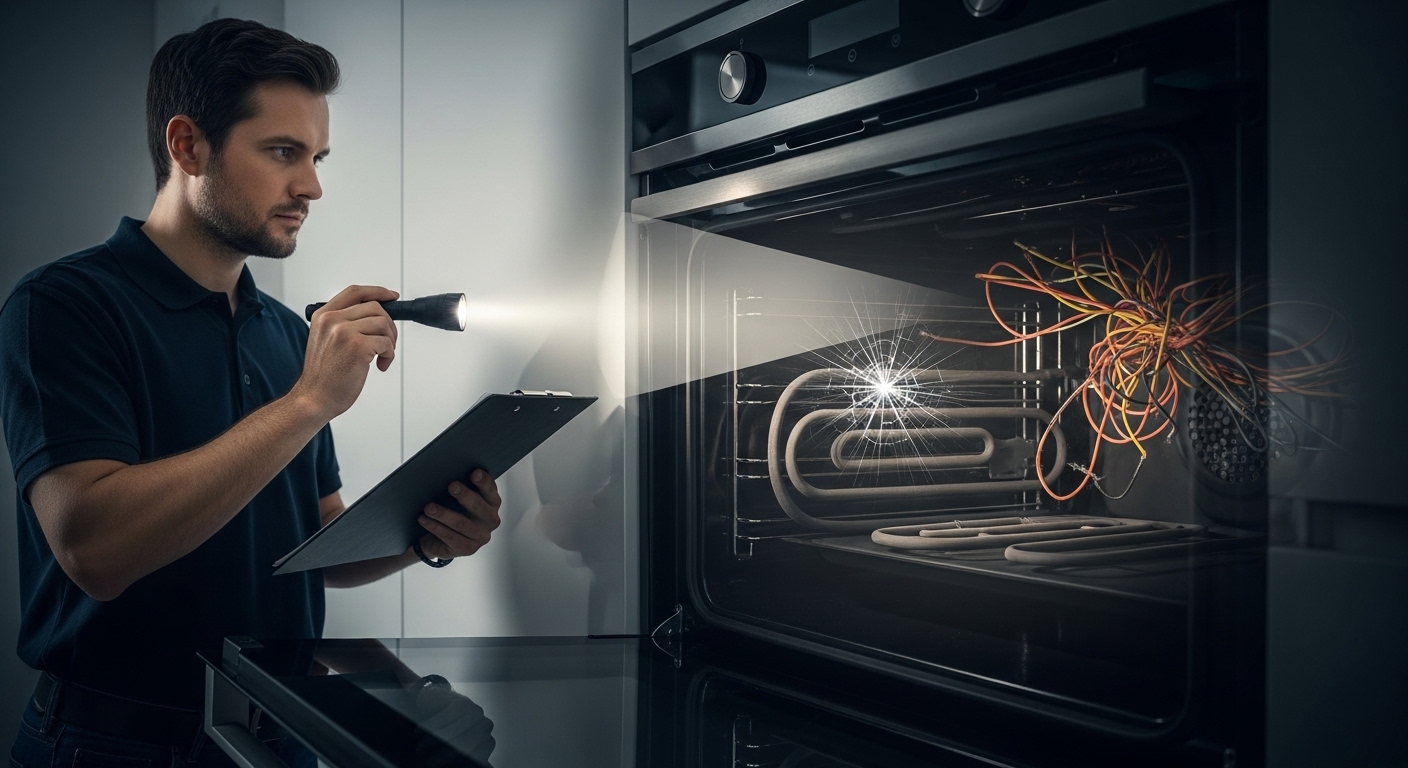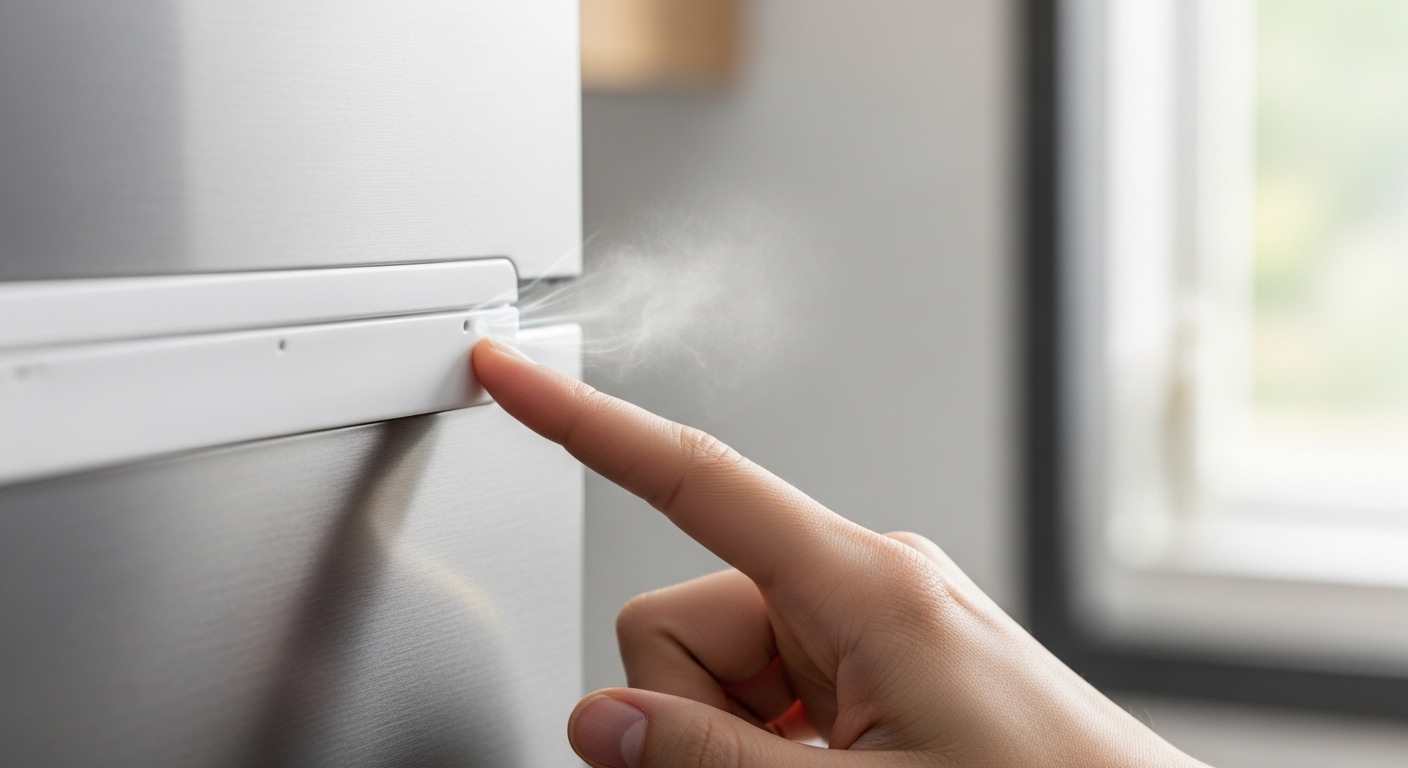Vancouver Home Buyers’ Appliance Inspection Checklist: Red Flags That Could Cost You Thousands After Moving In
Thinking about snagging that gorgeous Heritage Mountain house or downtown Coal Harbour condo, but worried about hidden appliance nightmares waiting to drain your bank account? Dive into this comprehensive Vancouver-specific inspection guide that reveals the red flags most home inspectors miss – and could save you thousands in unexpected repair bills before you even get your keys.Picture this: you’ve just closed on your dream home in Vancouver, complete with what looks like a stunning stainless steel kitchen that screams “move-in ready.” Fast forward three weeks, and your supposedly pristine dishwasher is flooding your hardwood floors, your fancy French-door refrigerator is making sounds like a dying whale, and that sleek induction cooktop? Yeah, it’s only heating on two burners. Suddenly, your celebration champagne tastes pretty bitter when you’re looking at $1,200 in appliance repairs before you’ve even unpacked your good dishes.  Here’s the thing about Vancouver’s red-hot real estate market – everyone’s so focused on square footage, location, and that killer mountain view that appliance inspection often gets treated as an afterthought. But trust me, after helping friends navigate their own appliance disasters (and learning from my own expensive mistakes), I can tell you that skipping a thorough appliance check is like buying a car without popping the hood. Sure, it looks great from the outside, but what’s lurking underneath could cost you way more than you bargained for.The Vancouver market adds its own special layer of complexity to appliance shopping. Between our coastal humidity that wreaks havoc on electronics, the logistical nightmare of replacing appliances in cramped Coal Harbour condos, and repair costs that make your eyes water faster than chopping onions, you really can’t afford to wing it. That’s why I’m sharing everything I wish I’d known before I bought my first place – a comprehensive inspection checklist that goes way beyond what your standard home inspector covers.
Here’s the thing about Vancouver’s red-hot real estate market – everyone’s so focused on square footage, location, and that killer mountain view that appliance inspection often gets treated as an afterthought. But trust me, after helping friends navigate their own appliance disasters (and learning from my own expensive mistakes), I can tell you that skipping a thorough appliance check is like buying a car without popping the hood. Sure, it looks great from the outside, but what’s lurking underneath could cost you way more than you bargained for.The Vancouver market adds its own special layer of complexity to appliance shopping. Between our coastal humidity that wreaks havoc on electronics, the logistical nightmare of replacing appliances in cramped Coal Harbour condos, and repair costs that make your eyes water faster than chopping onions, you really can’t afford to wing it. That’s why I’m sharing everything I wish I’d known before I bought my first place – a comprehensive inspection checklist that goes way beyond what your standard home inspector covers.
Key Outtakes:
- Home inspectors often skip detailed appliance testing, focusing only on basic operation rather than performance, leaving buyers vulnerable to expensive surprises after moving in
- Vancouver’s coastal climate and premium repair market create unique appliance risks that can cost $300-600+ per major repair compared to other Canadian cities
- Current major appliance recalls from LG and Samsung affect thousands of Vancouver homes, with some posing serious fire hazards from accidentally activated controls
- Condo-specific constraints can add $200-400 in replacement costs beyond the appliance price due to elevator size limits and building access restrictions
- Smart home appliance integration requires specialized testing that standard inspections don’t cover, potentially leaving security vulnerabilities and connectivity issues undetected

Understanding What Home Inspectors Actually Check (And What They Don’t)
Before we dive into the nitty-gritty of appliance inspection, let’s get real about what your standard home inspector actually does when it comes to appliances. Spoiler alert: it’s probably way less thorough than you think, and definitely not enough to protect you from expensive surprises down the road.Most home inspectors will test basic operation of built-in appliances but won’t verify thermostat calibration, heating element adequacy, or specialized features. This means they’ll turn on your oven to see if it heats up, but they won’t hang a thermometer inside to check if it actually reaches the temperature shown on the display. They’ll run your dishwasher through a quick cycle, but they won’t test its cleaning performance or check for proper drainage patterns that could indicate future leak problems.  The limitations get even more frustrating when it comes to removable appliances. Your inspector might not even touch that gorgeous French-door refrigerator or the stackable washer-dryer combo because removable appliances are often considered personal property and excluded from standard inspections unless specifically negotiated in your purchase agreement. This is particularly problematic in Vancouver’s condo market, where built-in appliances are often the norm and can cost a fortune to replace due to building access constraints.Here’s what really gets me fired up about this whole situation: inspectors focus primarily on safety concerns and major defects rather than performance optimization. While I absolutely appreciate them making sure your gas range isn’t going to blow up your kitchen, I also want to know if that same range is going to cost me $400 to fix when the temperature sensor inevitably fails in six months. The inspection might reveal that your appliances won’t immediately kill you, but it won’t tell you if they’re about to kill your budget.This gap in standard inspection coverage is exactly why you need to take matters into your own hands. Think of your inspector’s appliance check as a basic safety screening – important, but nowhere near comprehensive enough for a market where appliance repairs can easily cost more than a month’s mortgage payment. You need to go deeper, test more thoroughly, and ask the right questions to avoid those nasty post-purchase surprises.The good news is that with a little knowledge and some strategic testing, you can fill in these gaps yourself. You don’t need to be an appliance repair technician to spot the red flags that could save you thousands. You just need to know what to look for, what questions to ask, and how to interpret what you’re seeing. That’s exactly what we’re going to cover in the sections ahead, starting with the essential inspection checklist that every Vancouver home buyer needs to master.
The limitations get even more frustrating when it comes to removable appliances. Your inspector might not even touch that gorgeous French-door refrigerator or the stackable washer-dryer combo because removable appliances are often considered personal property and excluded from standard inspections unless specifically negotiated in your purchase agreement. This is particularly problematic in Vancouver’s condo market, where built-in appliances are often the norm and can cost a fortune to replace due to building access constraints.Here’s what really gets me fired up about this whole situation: inspectors focus primarily on safety concerns and major defects rather than performance optimization. While I absolutely appreciate them making sure your gas range isn’t going to blow up your kitchen, I also want to know if that same range is going to cost me $400 to fix when the temperature sensor inevitably fails in six months. The inspection might reveal that your appliances won’t immediately kill you, but it won’t tell you if they’re about to kill your budget.This gap in standard inspection coverage is exactly why you need to take matters into your own hands. Think of your inspector’s appliance check as a basic safety screening – important, but nowhere near comprehensive enough for a market where appliance repairs can easily cost more than a month’s mortgage payment. You need to go deeper, test more thoroughly, and ask the right questions to avoid those nasty post-purchase surprises.The good news is that with a little knowledge and some strategic testing, you can fill in these gaps yourself. You don’t need to be an appliance repair technician to spot the red flags that could save you thousands. You just need to know what to look for, what questions to ask, and how to interpret what you’re seeing. That’s exactly what we’re going to cover in the sections ahead, starting with the essential inspection checklist that every Vancouver home buyer needs to master.
Essential Vancouver Appliance Inspection Checklist
Now that we’ve established that standard home inspections won’t save you from appliance disasters, let’s roll up our sleeves and create your own comprehensive testing protocol. This isn’t about becoming an appliance repair expert overnight – it’s about developing the detective skills to spot problems before they become your expensive reality.
Refrigerator Deep-Dive Assessment
Your refrigerator is probably the hardest-working appliance in your future home, running 24/7 without complaint until suddenly it doesn’t. Start by listening for unusual noises – any grinding, squealing, or excessive clicking could indicate compressor or fan motor problems. I learned this lesson the hard way when I ignored a subtle grinding sound during my inspection, only to have the compressor fail three months later with a repair bill that made me question all my life choices.  Check the door seals meticulously by running your hand along the entire perimeter while the door is closed. Any areas where you feel cold air escaping indicate worn gaskets that will drive up your hydro bill and force the compressor to work overtime. Refrigerators that are overworked and close to breaking down will have very hot coils, so feel around the back or underneath for excessive heat that could signal impending failure.Temperature consistency is crucial but often overlooked. Place a glass of water in both the refrigerator and freezer sections, then check the temperature with a kitchen thermometer after a few hours. Your fridge should maintain 37-40°F while the freezer stays at 0°F. Any significant deviation suggests temperature control problems that will affect food safety and energy efficiency. Don’t forget to test the ice maker and water dispenser if present – these features are notoriously finicky and expensive to repair in Vancouver’s premium service market.
Check the door seals meticulously by running your hand along the entire perimeter while the door is closed. Any areas where you feel cold air escaping indicate worn gaskets that will drive up your hydro bill and force the compressor to work overtime. Refrigerators that are overworked and close to breaking down will have very hot coils, so feel around the back or underneath for excessive heat that could signal impending failure.Temperature consistency is crucial but often overlooked. Place a glass of water in both the refrigerator and freezer sections, then check the temperature with a kitchen thermometer after a few hours. Your fridge should maintain 37-40°F while the freezer stays at 0°F. Any significant deviation suggests temperature control problems that will affect food safety and energy efficiency. Don’t forget to test the ice maker and water dispenser if present – these features are notoriously finicky and expensive to repair in Vancouver’s premium service market.
Range and Oven Performance Testing
Your cooking appliances need more than a casual once-over, especially given Vancouver’s love affair with serious home cooking. For electric ranges, test every burner at multiple heat settings, paying attention to how quickly they heat up and how evenly they distribute heat. Hang a thermometer inside the oven to verify that actual temperatures match the display settings – a discrepancy of more than 25 degrees indicates calibration issues that will ruin your baking and potentially cost hundreds to fix.Gas ranges require extra attention to safety details. Check that all burners light evenly and consistently, with blue flames that don’t flicker excessively or burn yellow. Test the oven’s ignition system multiple times to ensure it lights quickly and reliably – a slow or hesitant ignition is a common failure point.
Dishwasher Leak and Performance Check
Look for any signs of past leaks, like water stains on the floor or warped cabinetry around the unit. Open the door and check the bottom for rust or standing water. Run a full cycle if possible, listening for unusual noises and checking for leaks at the end. I always suggest placing a paper towel under the front of the dishwasher during the test cycle – it’s a simple trick that makes even the smallest drips immediately obvious.
Washer and Dryer Durability Test
For washers, check for musty smells that indicate mold growth in the seal, a common issue in our humid Vancouver climate. Run a short cycle and listen for loud banging or grinding sounds, which could mean bearing or suspension problems. For dryers, verify that it heats up properly and that the lint trap is clean and fits snugly. A clogged or damaged vent system is a major fire hazard that inspectors often flag, but you should check the appliance side yourself.
Condo-Specific Considerations for Vancouver Buyers
If you’re buying a condo in Yaletown, Coal Harbour, or any other high-rise, your appliance inspection needs an extra layer of diligence. Appliance replacement in condos can be a logistical nightmare, with extra costs for navigating elevators, tight hallways, and building restrictions. Measure the appliances and compare them to the elevator dimensions – I’ve seen friends buy a place only to discover their dream fridge won’t fit in the service elevator, adding hundreds in crane fees or forcing them to buy a smaller model. Also, check the building’s rules about appliance installation and water shut-offs. Some stratas have strict requirements that can add time and expense to any future replacements.
Navigating Smart Appliances and Recalls
That fancy smart fridge that connects to your WiFi? It’s amazing until it’s not. For smart appliances, you need to go beyond basic function and test connectivity. Ask the current owners to demonstrate the app integration and check if the software is up to date. Outdated firmware can lead to performance issues and even security vulnerabilities. Finally, and this is non-negotiable, you must check for active recalls. Get the model and serial numbers for every major appliance and search them on the Health Canada recall database. Major brands like LG and Samsung have had significant recalls in recent years for fire hazards related to dishwashers and ranges, and you do not want to inherit that risk.
Frequently Asked Questions (FAQs)
- Should I hire a separate appliance inspector in Vancouver? While it adds an extra cost (typically $150-$250), it can be a smart investment for luxury homes or properties with high-end, complex appliances. An appliance specialist can perform diagnostic tests that a general home inspector can’t, giving you a much clearer picture of the appliances’ remaining lifespan and potential repair costs.
- What if the sellers won’t let me run a full test cycle on the dishwasher or washing machine? This is a major red flag. If they are resistant to a full inspection cycle (which can take 1-2 hours), it might be because they know there’s a problem with noise, leaks, or performance. Politely insist on it as a condition of your offer, explaining that it’s a standard part of your due diligence.
- Are older, simpler appliances a safer bet than new, high-tech ones? It’s a trade-off. Older appliances often have fewer electronic components that can fail, but their mechanical parts might be worn out and replacement parts harder to find. Newer smart appliances offer great features but introduce new points of failure. The key is to assess the specific condition and brand reputation of what’s in the home.
- How do I check for appliance recalls? You can check the Health Canada recall database by searching for the appliance brand and model number (usually found on a sticker inside the door or on the back). This is a critical step, especially with recent widespread recalls.
Wrapping Up Your Appliance Inspection
Buying a home in Vancouver is stressful enough without adding the worry of a $2,000 appliance repair bill the month you move in. By going beyond the standard home inspection and using this detailed checklist, you’re not just checking boxes – you’re protecting your investment and ensuring your new house truly feels like a move-in-ready home. Take the extra hour during your inspection to be thorough. Test every cycle, listen for strange noises, check for recalls, and don’t be afraid to ask tough questions. Your future self (and your bank account) will thank you.


